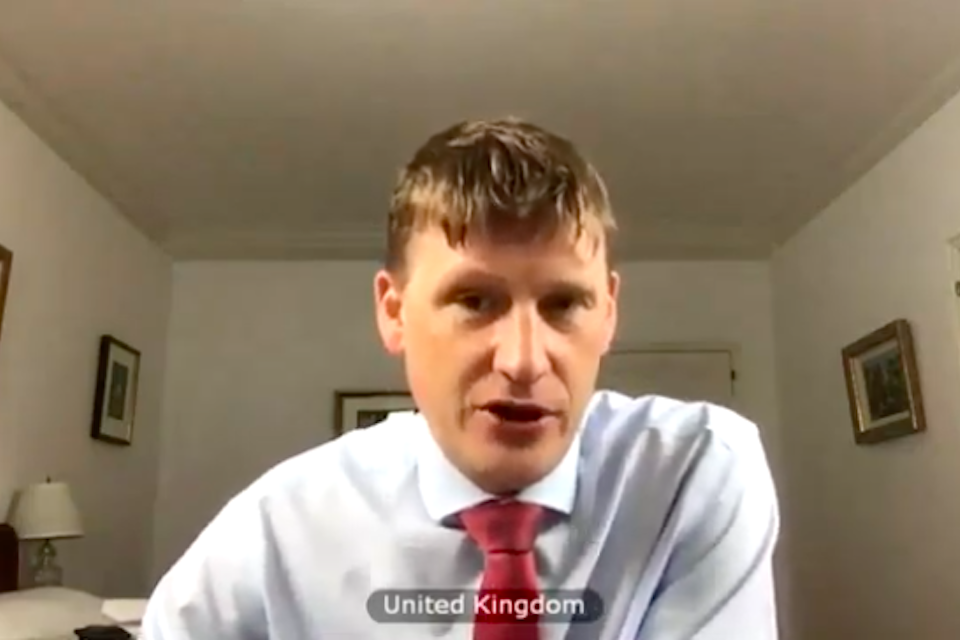Moving toward peace negotiations in the Middle East
Statement by Ambassador Jonathan Allen, UK Chargé d’Affaires to the UN, at the Security Council briefing on the Middle East.

Thank you, Mr President. I’d like to welcome you to the Council today and thank you for giving me the floor. Thank you also to Nikolai for your briefing and of course for the continued efforts you and your team are making on the ground. And I want to thank also our two civil society briefers who I thought were very interesting and passionate in what they had to say, and for their work. And of course, it’s always nice to hear from my good colleagues, the DPRs of Israel and the Observer State of Palestine. Thank you all.
Mr President, as we have heard, this is a fragile and worrying period. I want to say, firstly, we remain deeply concerned about the prospect of annexation. Not only would this be damaging to efforts to restart peace negotiations and contradict international law, it would also compound the already fragile health and humanitarian situation. The priority must be on preventing annexation and finding alternative ways for the parties to engage. And I reiterate that the United Kingdom will not recognise any changes to the 1967 lines except those agreed between both parties.
Ultimately, we want to see both sides make meaningful steps towards a just, fair and agreed settlement. As my Prime Minister said to both Prime Minister Netanyahu and President Abbas earlier this month, we want to see Israelis and Palestinians return to the negotiating table. And the United Kingdom offers its full support in fostering such dialogue.
Now is the time for Israel to make clear that it will not take any unilateral steps towards annexation. Now is the time for both parties to resume cooperation, particularly in regards to security. And now is the time for the Palestinians to reach out to the United States and to Israel so that we can begin the journey back to negotiations.
Mr President, in creating the environment of trust needed for dialogue, we call on both parties to avoid further provocative rhetoric or actions. We call for accountability against incitement on both sides and for Israel to freeze all settlement activity, stop demolitions and actively prevent settler violence. The advancement of settlement plans, including in Givat Hamatos, Bar Homa and E1 is of particular concern. All settlements are illegal under international law. Settlement construction in these highly sensitive areas threatens to further undermine the viability of a future Palestinian state with its capital in East Jerusalem.
In instances where there have been accusations of excessive use of force by the Israeli authorities - as appears to be the case in the killing of the Eyad Falak in May - we expect full, transparent investigations. There must be serious reflection on what causes such use of force to be deemed necessary. Meanwhile, we saw a steady increase in indirect fire attacks from Gaza into Israel from late May until early July. This shows the very real and unacceptable intent of militant Palestinian groups towards Israeli civilians. Every Israeli and Palestinian has the right to live in peace and security.
Mr President, COVID-19 remains a serious and significant threat in Israel and the occupied Palestinian territories. The cooperation between UN agencies, the Palestinian Authority and the Government of Israel during the first wave was welcomed, ensuring that essential medical supplies and staff were able to access Gaza and the West Bank. Faced with rising numbers of COVID cases, we call on the parties to resume cooperation, making joint efforts to protect equally both Israelis and Palestinians.
Mr President, I’d like to finish by reiterating once again the United Kingdom’s longstanding position on the Middle East peace process. We support a negotiated settlement leading to a safe and secure Israel living alongside a viable and sovereign Palestinian state based on 1967 lines with agreed land swaps, Jerusalem as the shared capital of both states and a just fair, agreed and realistic settlement for refugees. And the United Kingdom stands ready to support that objective in any way that we can.
Thank you, Mr President.